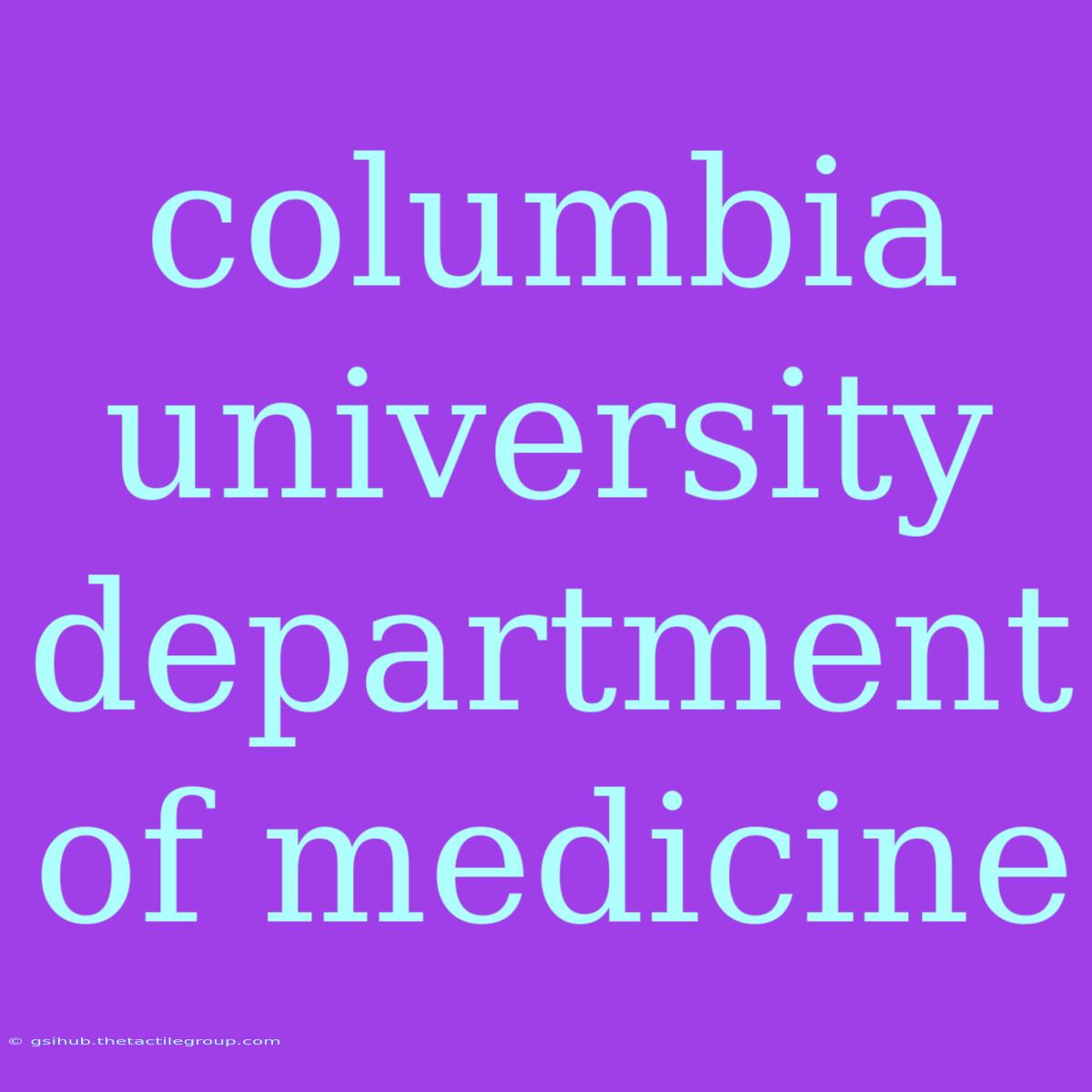Columbia University Department of Medicine: Excellence in Medical Research and Education
Is Columbia University's Department of Medicine a leader in medical innovation? Absolutely! The department's groundbreaking research and commitment to exceptional medical education make it a global powerhouse.
Editor's Note: This comprehensive guide to the Columbia University Department of Medicine was published today. Understanding this institution's impact on medical advancements is crucial for anyone interested in healthcare, research, or medical education.
Why This Matters: The Columbia University Department of Medicine significantly impacts global health. Its contributions to medical research, the training of future physicians, and its overall influence on the medical field are unparalleled. This overview provides key insights into its structure, achievements, and ongoing contributions.
Analysis: This article meticulously examines the Columbia University Department of Medicine, drawing upon publicly available information from the university's website, reputable news sources, and medical journals. The goal is to provide a clear and concise understanding of the department's activities and influence.
Key Highlights of Columbia University Department of Medicine
| Aspect | Description |
|---|---|
| Research Focus Areas | Cardiology, Oncology, Neurology, Immunology, and many more interdisciplinary fields |
| Clinical Care Excellence | Renowned hospitals and clinics offering cutting-edge patient care |
| Educational Programs | Top-ranked medical school and residency programs training future medical leaders |
| Faculty Expertise | World-renowned physicians, scientists, and researchers |
| Global Impact | Significant contributions to medical advancements worldwide |
Columbia University Department of Medicine
Introduction: This section explores the key aspects of the Columbia University Department of Medicine, highlighting its prominent role in medical education, research, and patient care.
Key Aspects:
- Research: Groundbreaking discoveries and clinical trials.
- Education: Top-ranked medical school and residency programs.
- Clinical Care: State-of-the-art facilities and renowned physicians.
- Faculty: World leaders in their respective medical fields.
- Innovation: A constant drive for advancements in medical technology and treatment.
Research at the Columbia University Department of Medicine
Introduction: The Department's research efforts are a cornerstone of its influence, consistently pushing the boundaries of medical knowledge.
Facets:
- Research Areas: Focusing on major diseases and health challenges. Examples include cancer research, cardiovascular disease research, and neurological disorders research.
- Funding: Securing substantial funding from governmental and private sources. This ensures continued research and advancements.
- Collaboration: Engaging in extensive collaborations with other institutions and researchers.
- Impact: Generating significant publications and impacting clinical practice.
- Technological Advancements: Utilizing advanced technologies and techniques in research.
Summary: The research conducted by the department significantly contributes to medical advancements and improving patient outcomes globally. The department's ability to secure significant funding underscores its importance within the medical community.
Medical Education at Columbia University Department of Medicine
Introduction: The Department's educational programs nurture future generations of physicians and researchers. The quality of education directly correlates with the quality of healthcare professionals entering the field.
Further Analysis: The medical school's rigorous curriculum and diverse range of educational opportunities contribute to its high ranking. Residency programs offer specialized training in various medical fields, producing highly skilled physicians.
Closing: The Department's commitment to high-quality medical education creates a pipeline of exceptional medical professionals equipped to lead in the medical field. The legacy of training future physicians is crucial to the ongoing advancement of medical science and practice.
FAQ
Introduction: This section addresses common questions about the Columbia University Department of Medicine.
Questions:
- Q: What are the Department's main research areas? A: Cardiology, Oncology, Neurology, Immunology, and many others.
- Q: Where are the affiliated hospitals located? A: Primarily in New York City, with various locations across the metropolitan area.
- Q: How competitive is admission to the medical school? A: Extremely competitive, requiring exceptional academic achievements and qualifications.
- Q: What kind of support does the department offer students? A: A comprehensive support system including academic advising, financial aid, and research opportunities.
- Q: What is the department's global impact? A: Extensive through research discoveries, training global medical professionals, and contributions to global health initiatives.
- Q: How can I learn more about research opportunities? A: The department website provides detailed information on research labs and contact information for researchers.
Summary: The FAQ section clarifies frequently asked questions providing helpful insight into the Department of Medicine.
Tips for Prospective Students
Introduction: This section provides practical advice for prospective students interested in the Department of Medicine.
Tips:
- Strong Academic Record: Maintain high grades and scores on standardized tests.
- Meaningful Experiences: Engage in relevant extracurricular activities and research experiences.
- Compelling Application: Carefully craft a strong personal statement highlighting your goals and motivations.
- Networking: Attend events and connect with faculty and current students.
- Letters of Recommendation: Secure strong letters of recommendation from professors and mentors.
- Thorough Research: Familiarize yourself with the department's research and educational opportunities.
Summary: A strong application requires preparation and dedication. These tips are intended to help prospective students significantly increase their chance of acceptance.
Conclusion: A Legacy of Excellence
Summary: This overview has explored the key components of the Columbia University Department of Medicine – its dedication to research, high-quality medical education, and exceptional patient care.
Closing Message: The Columbia University Department of Medicine stands as a beacon of medical excellence, shaping the future of healthcare through innovation, research and the training of outstanding medical professionals. Its ongoing contributions continue to advance medical knowledge and improve lives globally.

